Executive Summary
Baskin Robbins has the plan of expending its products in retail stores, shelf product in the grocery stores freezers differently from the its ice cream stores. The premium ice cream is a highly competitive product that correlates to healthy living as its has low sugar icing and fat content. The targeted population is the working, middle and high class which includes almost 90% of the whole population.
The marketing objectives is to introduce the product and gain most sales that its competitors during the first financial year. With high competition expected, the company will use valued added pricing to gain the required market share.
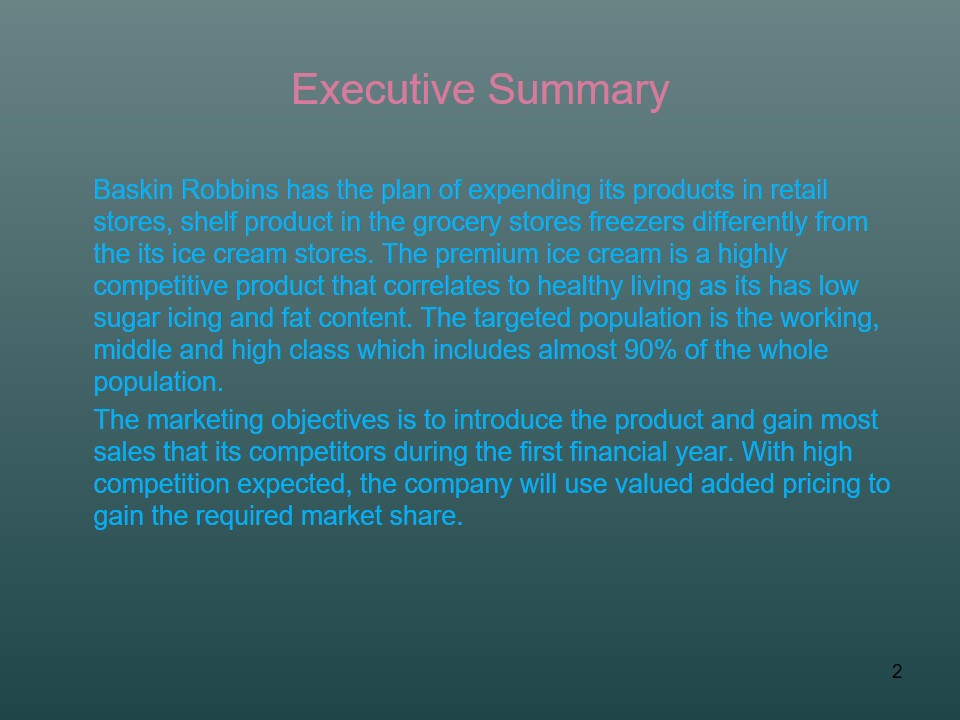
Objectives and Issues
Statement of Marketing Objectives for first year only:
- üBaskin Robbins aims at expending its products into retail stores in the first year.
- üDuring Baskin Robin’s first year operations in the market, the company aims at selling more than its competitors.
- üExpand the companies products in shelf product in the grocery stores freezers and have a differentiation between its products and thhose found in their ice cream stores.
Issues
In achieving the objectives, the major issues is the challenge to compete with the already existing products which could act as substitutes. The company has to measure products awareness as well as its response for marketing strategies adjustments.
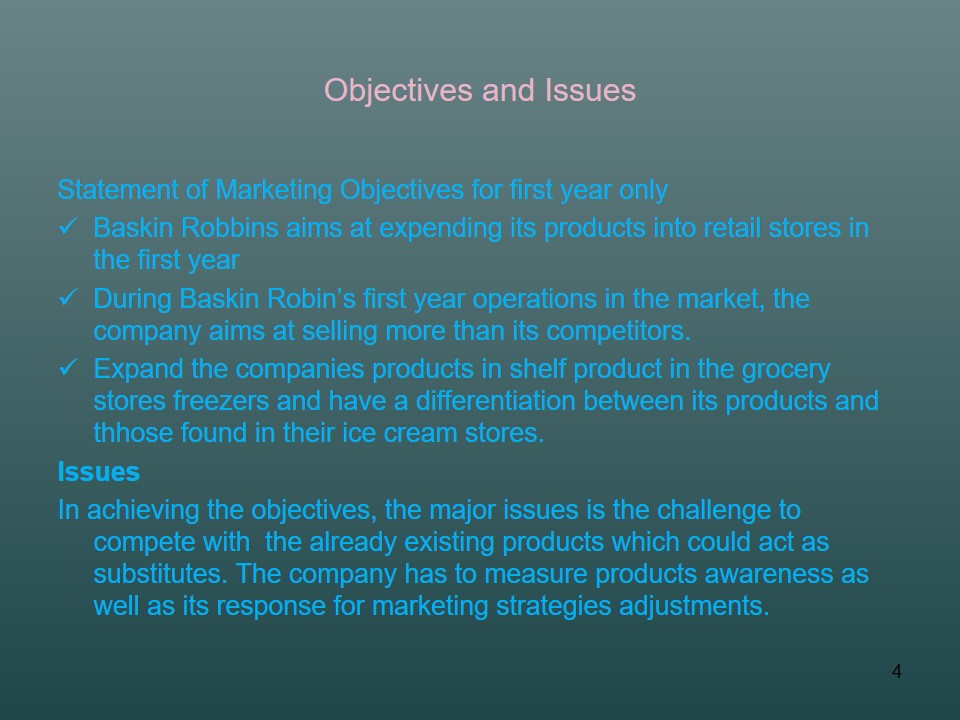
Issues That May Hinder Marketing Objectives
- Disease outbreak related to dairy products such as mad cow disease.
- Social cultural ethics from some areas that do not allow the consumption of ice cream.
- Economic recession that has affected the globe will have potential effects on the company’s budget plan for marketing.
- global fluctuation in food prices.
- Competition from various key players in the market which have potential effect in the implementation of marketing objectives.
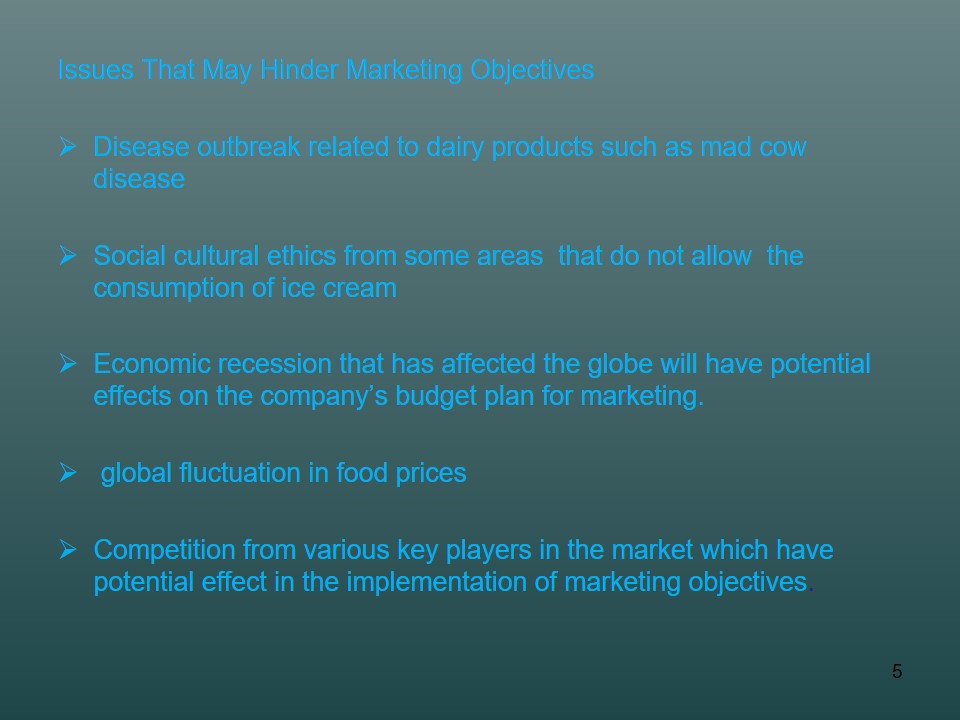
Marketing Strategy Recommendations
Positioning Strategy
- Baskin will use product differentiation to position its products in the market in more convenient places for its targeted consumers in the market.
- Through the use of the premium ice cream, Baskin Robins will place its products in the grocery stores and shelves to differentiate them from the products from the ice cream stores.
- It will use the different 31 flavors as well as the premium ice creams to get the desired market share (Baskin Robins, 2011).
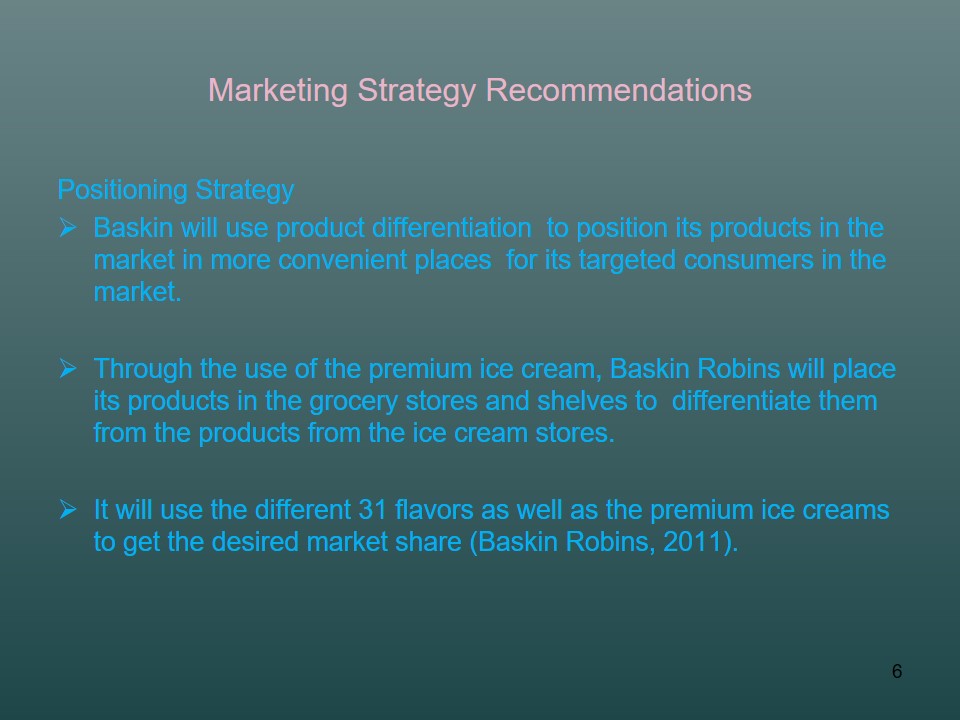
Marketing Mix Strategy
Product And Branding Strategy
- The premium quality ice cream which is the most preferred ice-cream will be used to design a product with low fat and sugar ice content for its targeted consumers. This will create a strong brand of ice cream.
- For the branding, the company will display its logo on the packaged ice cream more distinctively. This will ensure brand uniqueness and differentiation from the competitors products in the market.
- Through a prominence marketing campaign, the company will create an awareness for its new brand.
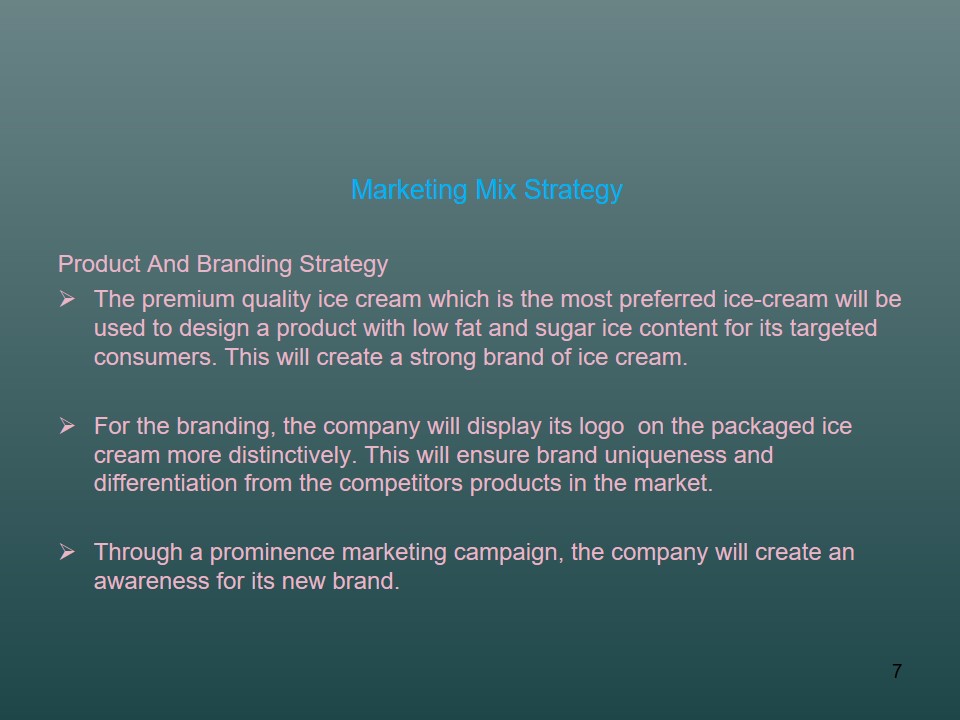
Pricing Strategy
- Baskin Robins will price its ice cream at a prices which lies at par with the competitors’ prices.
- The pricing strategy will ensure that all the segmented customers have the capacity to buy their products (Kumar et al., 2001).
- Since the company is vocal in the market operations, it will reduce its prices a little to attract more customers (Lamb, Hair & McDaniel, 2006).
- Baskin Robins will employ value added pricing as part of its pricing strategy. This will be achieved through the development of low fat and ice sugar ice cream that targets the health conscious target population.
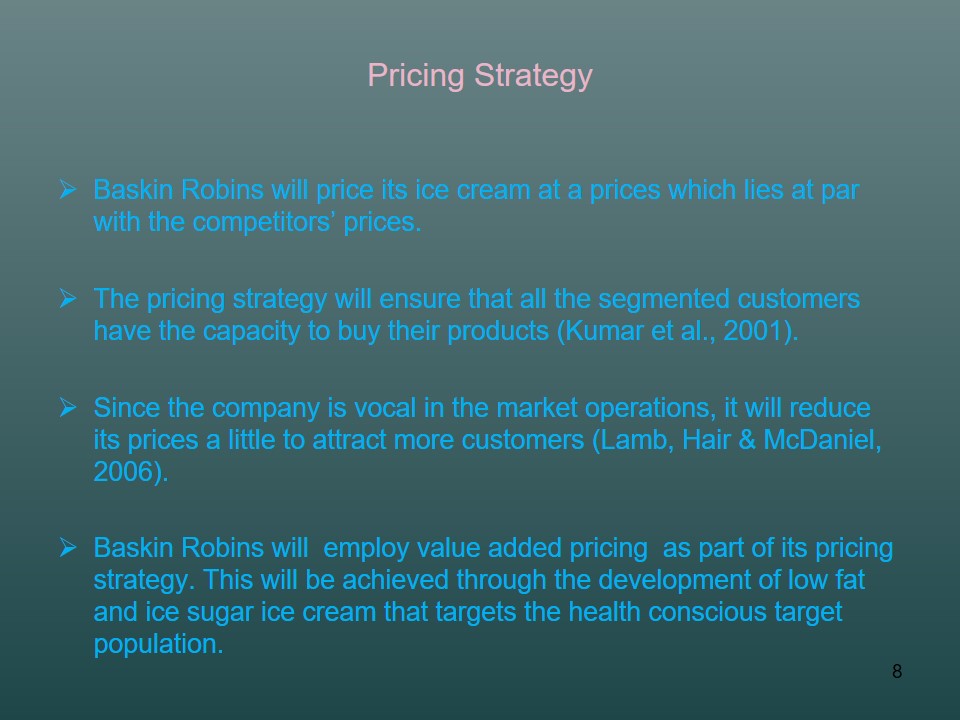
Distribution Strategy
- The company already has at its disposal existing distribution networks for its products.
- Baskin Robins will employ selective distribution to market its products through different distribution centers across the nation.
- The products will be distributed and marketed to franchised stores and retail stores which form the distribution channel.
- Consumers will be reached in the different franchised grocery stores as well as in the retail stores (Baskin Robins, 2011).
- Weekly analysis will be conducted to assess the effectiveness of the distribution channels and corrective measures taken if it does not deliver as required.
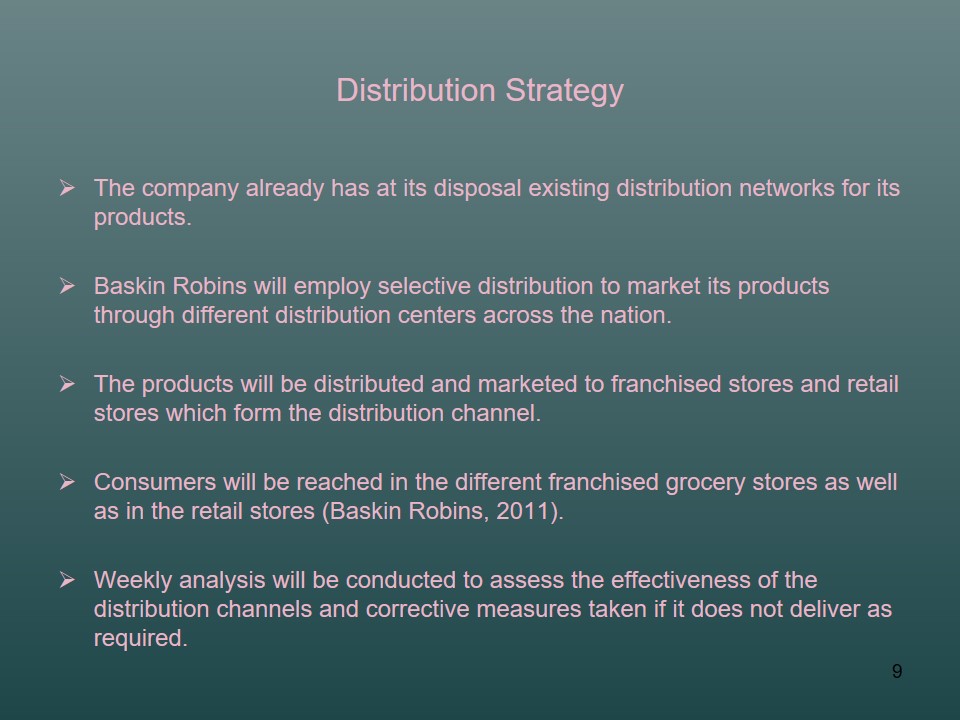
Marketing Communications Strategy
- Baskin robins will integrate messages from different medias used to create a brand awareness and reinforce the product differentiation.
- Through research, the most consumed media pattern will be established to assist the advertising department to choose the most suitable media that would reach the consumers before and upon introduction of the product (Kotler & Armstrong, 2010).
- Advertising and sales promotions will be used to maintain brand awareness and act as a platform for communicating differentiation messages (McDonald & Wilson, 2011) .
- Through coordination of the public relations, the company’s brand name will be established.
- Personal selling and promotions will be employed as a push strategy to retain, attract and maintain different channel partners.
- The marketing activities will be directed to the final consumers. This will induce the consumers to buy the product .
- This will act as a pull strategy as customers will be pulled towards the good through media means like the use of TV or the radio (Kotler & Armstrong, 2010).
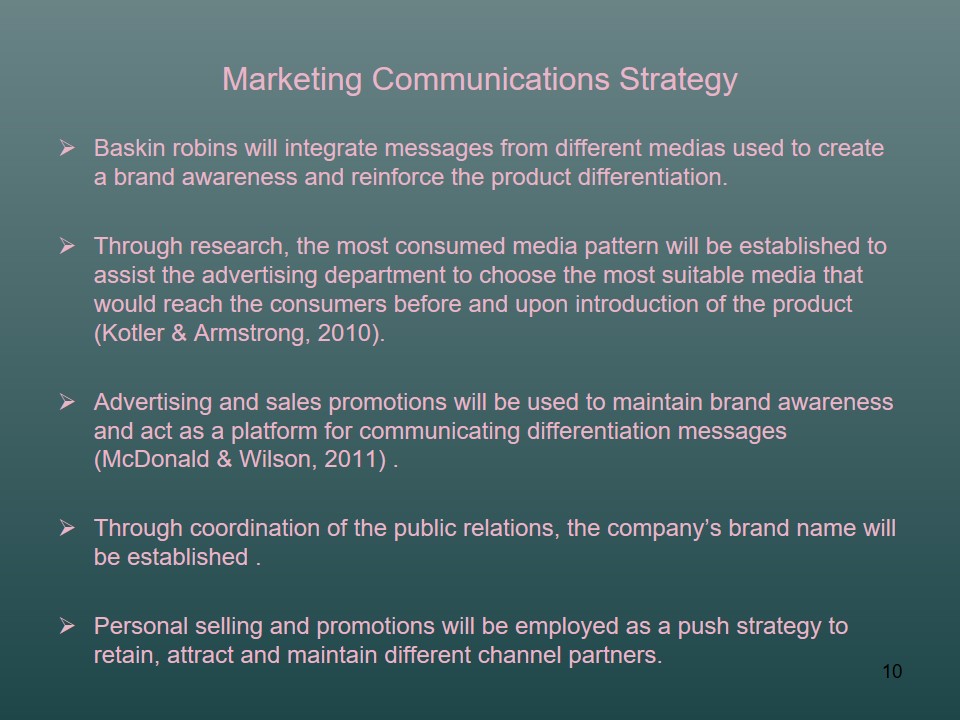
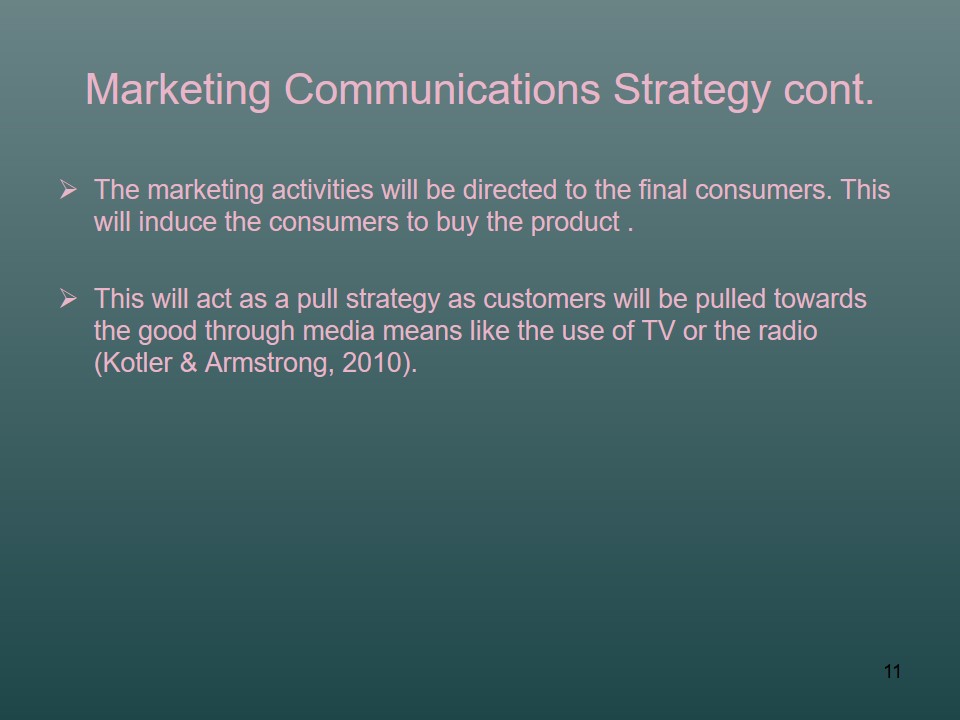
Marketing Research
- Baskin Robins will use research to identify the unique features as well as the benefits that the targeted market segments value most.
- Feedback from focus groups, surveys , and market analysis will be useful in developing the premium ice cream (Boone & Kurtz, 2012).
- The attitude and perception of the consumers towards competitors’ products and brands will be measured and analysed.
- The research from brand awareness will be useful in determining the efficiency and the effectiveness of the media and its conveyed messages.
- Studies from customer satisfaction will be used in gauging the market reaction.
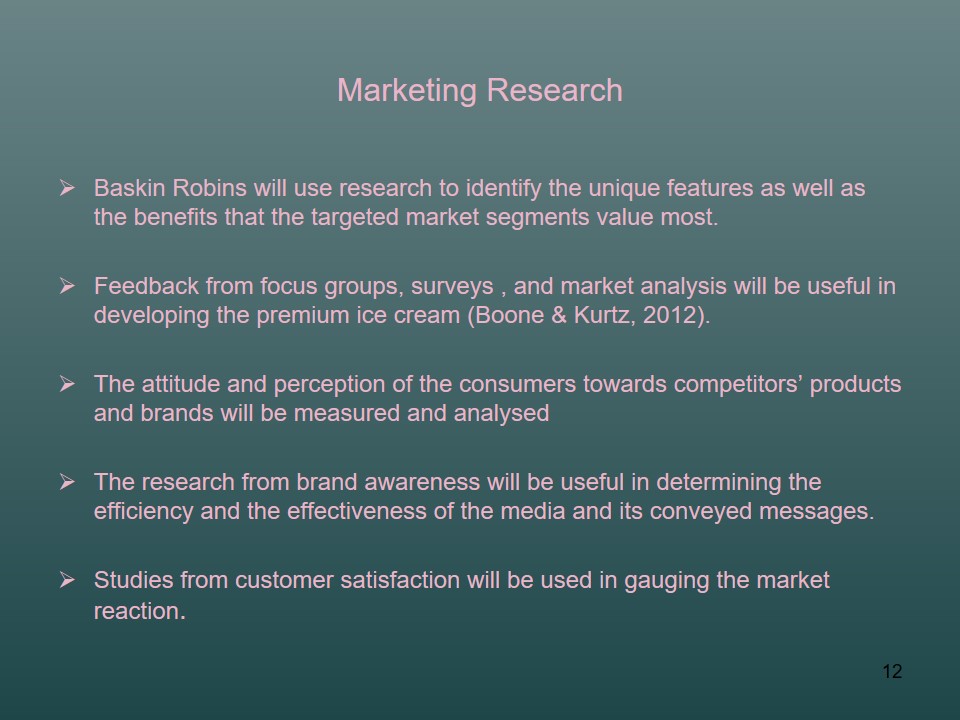
Action Programs
Upon the introduction of the product, an action program will be used for the first 6 months to help achieve the stated objectives.
- The first month will involve sales promotions and exhibitions during trade shows so as to educate various dealers as well as generating channel support.
- The second month will entail the integration of advertising campaigns of the product targeting the segmented markets. Online adverts targeting the youth and the technologically savvy group will be applied.
- The third month will involve the continuation of integrated marketing communication. Sales promotions will be established at different retail stores and the grocery stores.
- The fourth month will involve trade shows and contests to loyal customers as well as retail and grocery stores that attracts most consumers.
- The fifth month will involve nation wide advertising campaigns. Renowned celebrities will used to add voice to the uniqueness and how the products are health friendly.
- The sixth month will include radio campaigns and the final advertisements for the products. Consumer satisfaction surveys will be analysed for future promotional use and feedback on product as well as marketing activities.
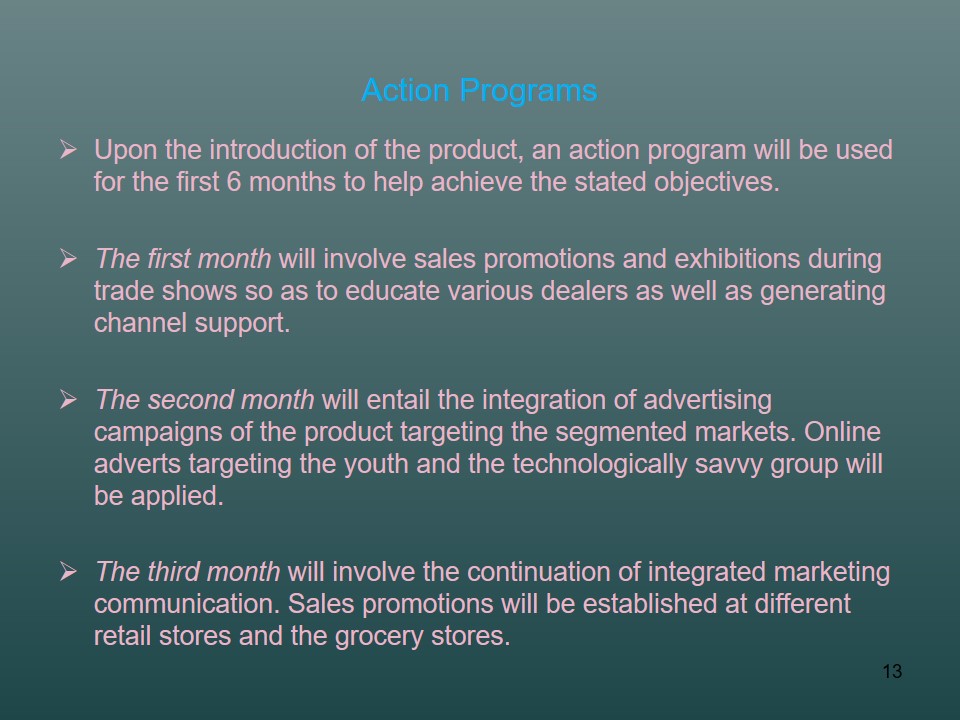
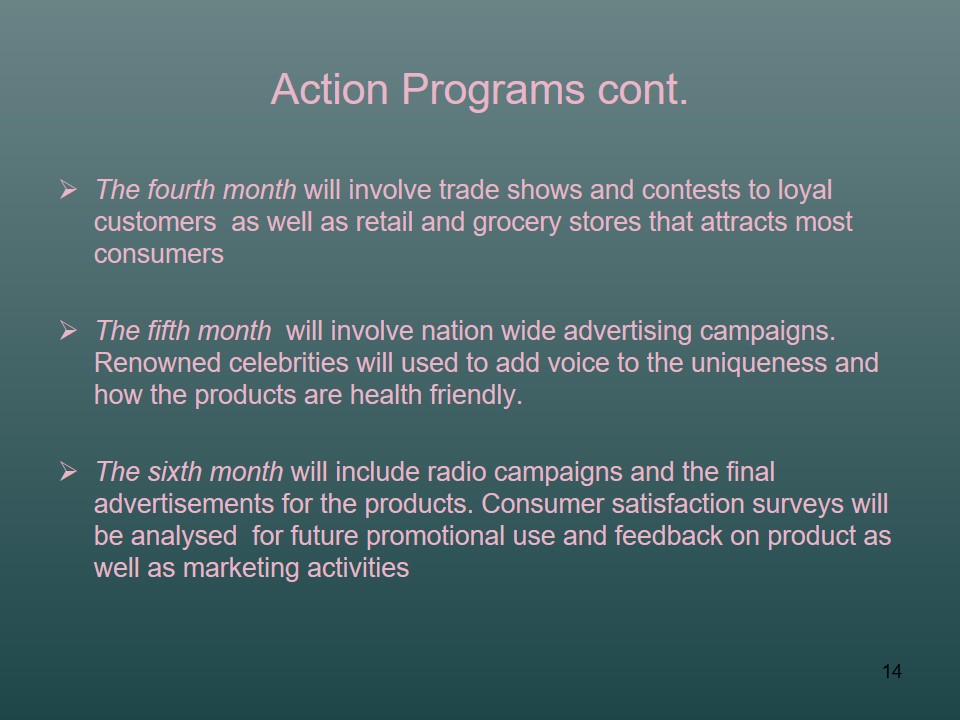
Message Design, Content and Structure
- The design of the message will use the AIDA model whereby it will create attention, capture interest, awaken desire, and acquire action (Lamb, Hair & McDaniel, 2006).
- The message contained will create moral, emotional and rational appeals (Boone& Kurtz, 2012).
- The rational appeal will thrive to focus on the expectation of the consumer from the product while emotional appeals will be employed to stir both negative and positive emotions to attract consumer attention. Moral appeals will be used to urge the consumers in matters that concern the society.
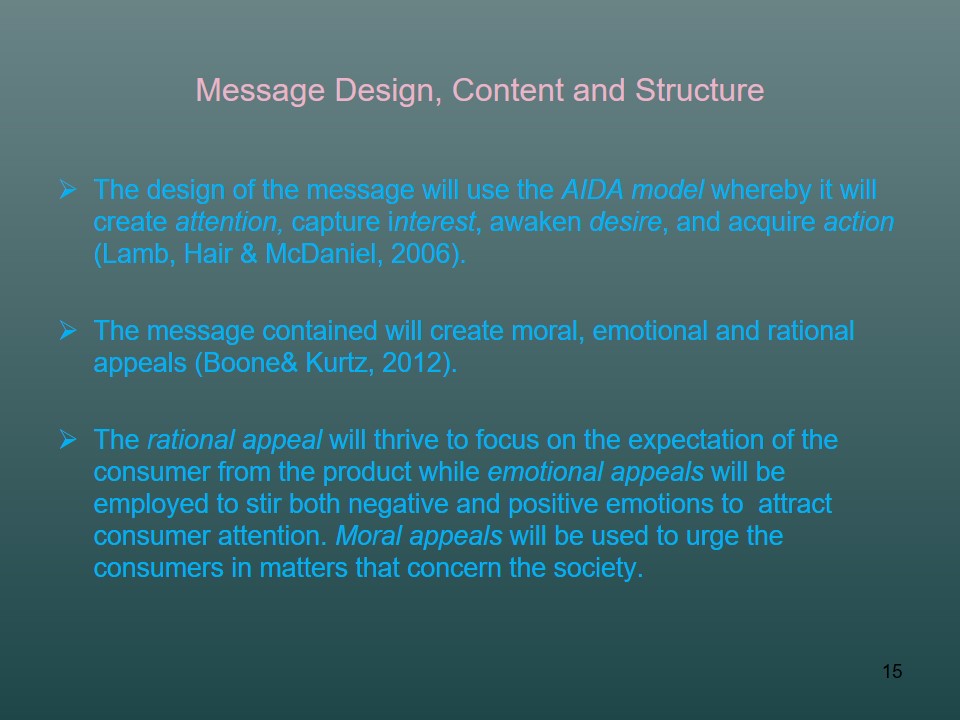
Media Choice
- The targeted population include all people in the society , thus non-personal communication channels will be applied as they reach a wider range of people.
- Print media , broad cast media, and online media will be applied. More specifically, TV, magazines, newspapers, internet, and radio will be used (Kotler & Armstrong, 2010).
- They will be chosen as they directly affect the buyers as well indirectly through the mass media.
- This would stimulate the required response as mass group will be relate to one another through the word of mouth.
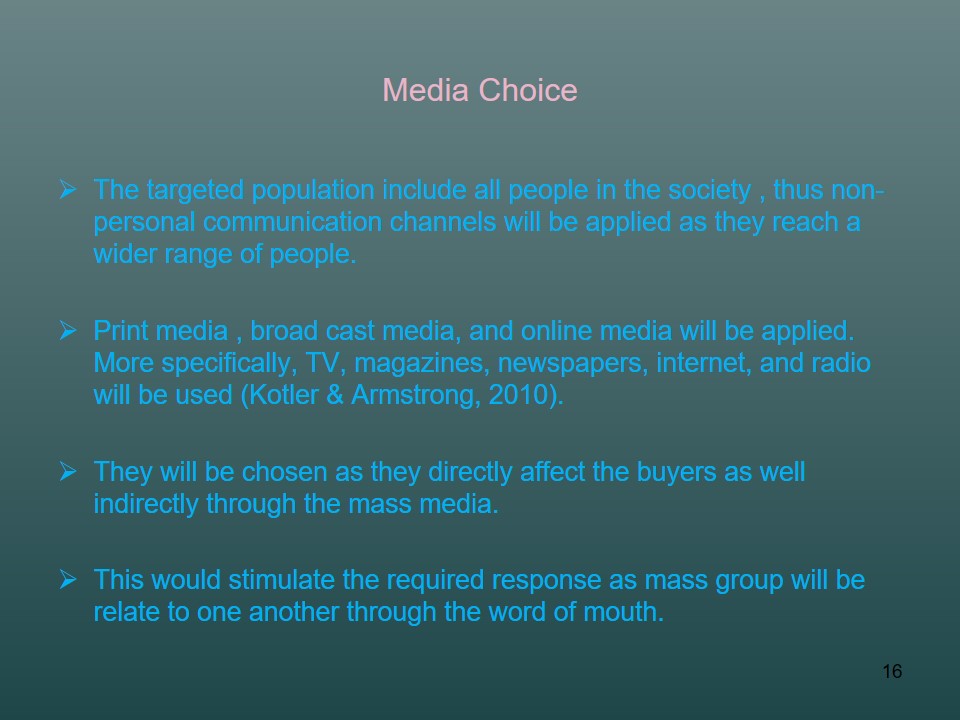
Promotion Mix Tools
- Baskin Robins will blend direct marketing tools, sales promotion, public relations, advertising, and personal selling to persuade its consumers as well as building a strong customer relationship.
- Advertising will be carried through the print media, online, TV and radio to reach consumers.
- Sales promotions through promotions and discount will involve short-term incentives meant to encourage consumers purchase more products (Kotler & Armstrong, 2010).
- Personal selling through incentive programs and trade shows will enable the company build a strong relationship with its consumers.
- Public relations with different bodies to receive favourable publicity, build a excellent corporate image , as well as handling public rumors. Press release and sponsorship will be appropriate.
- Direct marketing, where the company will connect carefully with the target population so as to get the immediate feedback and encourage a long-term consumer relationships (Kotler & Armstrong, 2010).
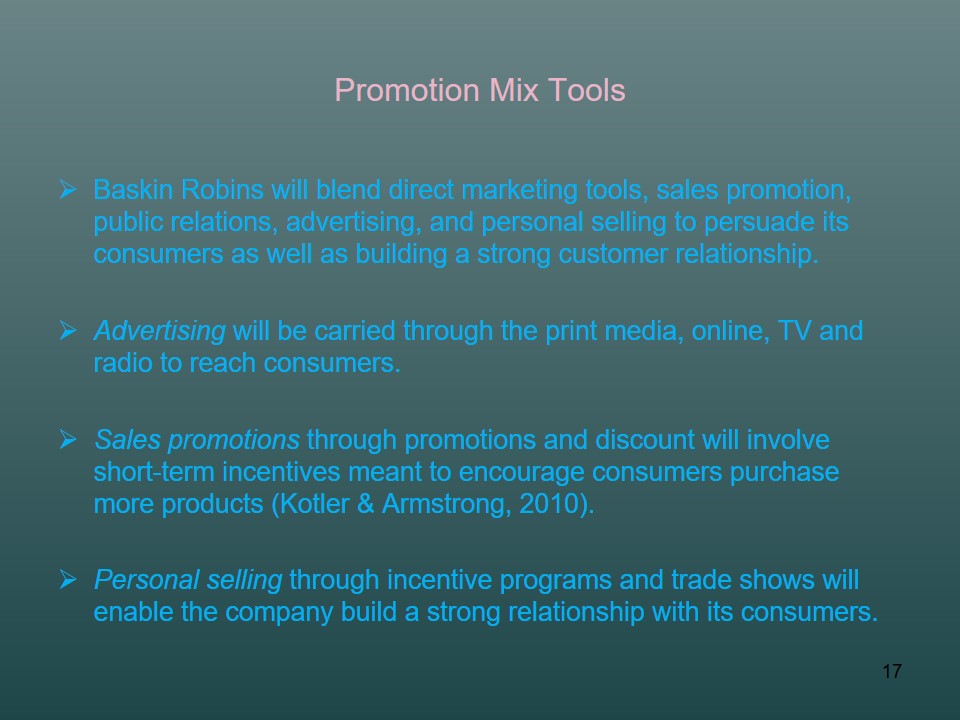
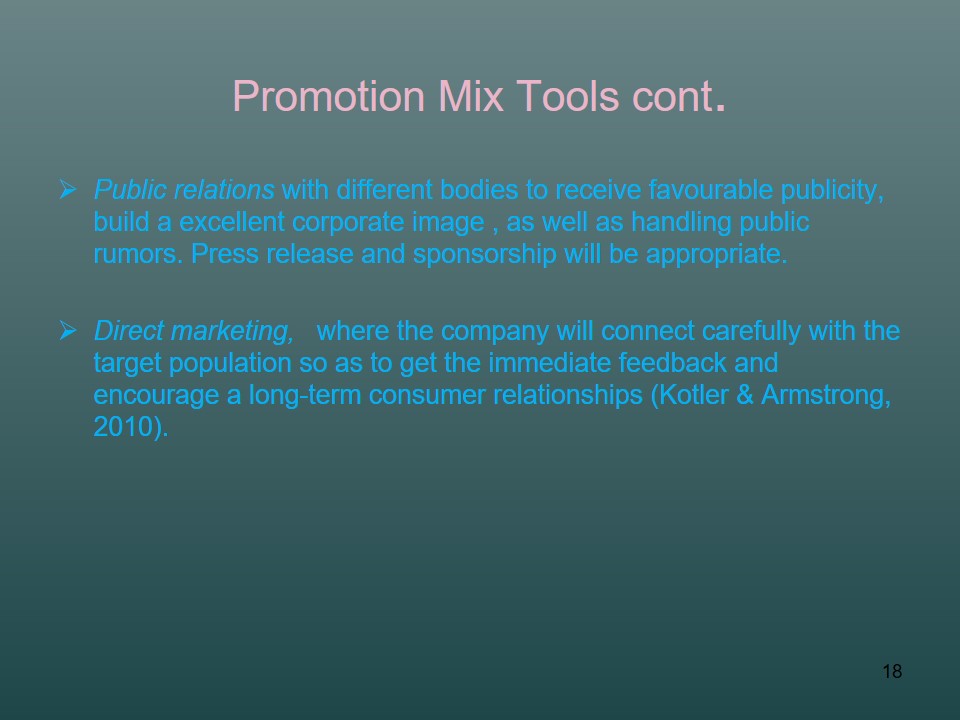
Budgets
For the marketing plan to be successful, Baskin Robbins will use 10% of its annual revenue from its products.
The budget allocations will cater for the advertisements, sales promotions, public relations, and other expenses that will be incurred.
Since the company’s products are well known, the company estimates a 20% revenue projections in sales for the first financial year. This will be used to expand the business further in the following year.
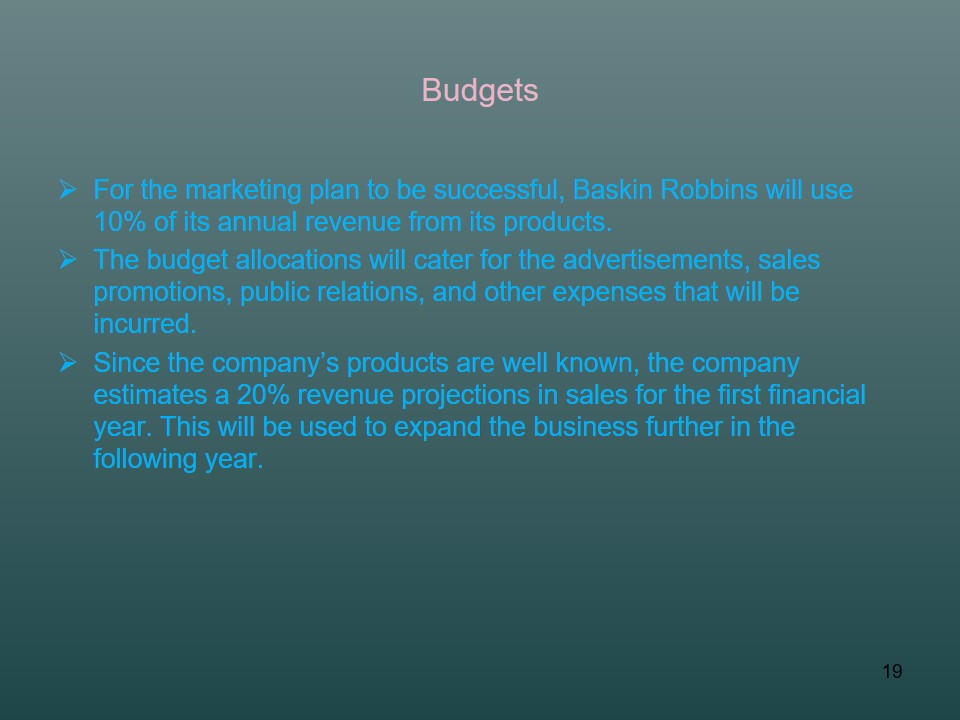
Objective/Task Method
The objective of the budget is to ensure that Baskin Robbins expends its ice cream products in the grocery stores.
The budget will cater for the whole marketing plan until the product becomes marketable and gains the required market share.
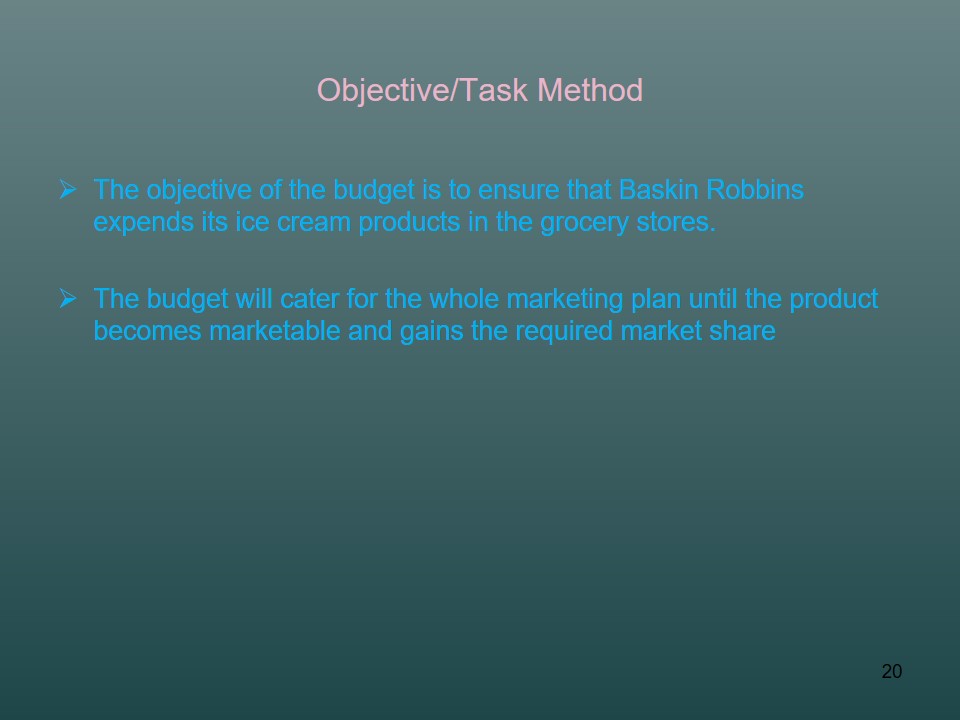
Controls
- Tight control measures will be put in place to monitor the satisfaction of the consumer and customer service quality.
- This would be useful in ensuring quick response to correct any misfortunes and problems.
- Evaluations based on the standard and actual progress (Kotler & Armstrong, 2010), will be done on monthly basis to ensure the marketing plan works as expected.
- Contingency plan will be available to correct any deviation or problem that may arise in course of the process.
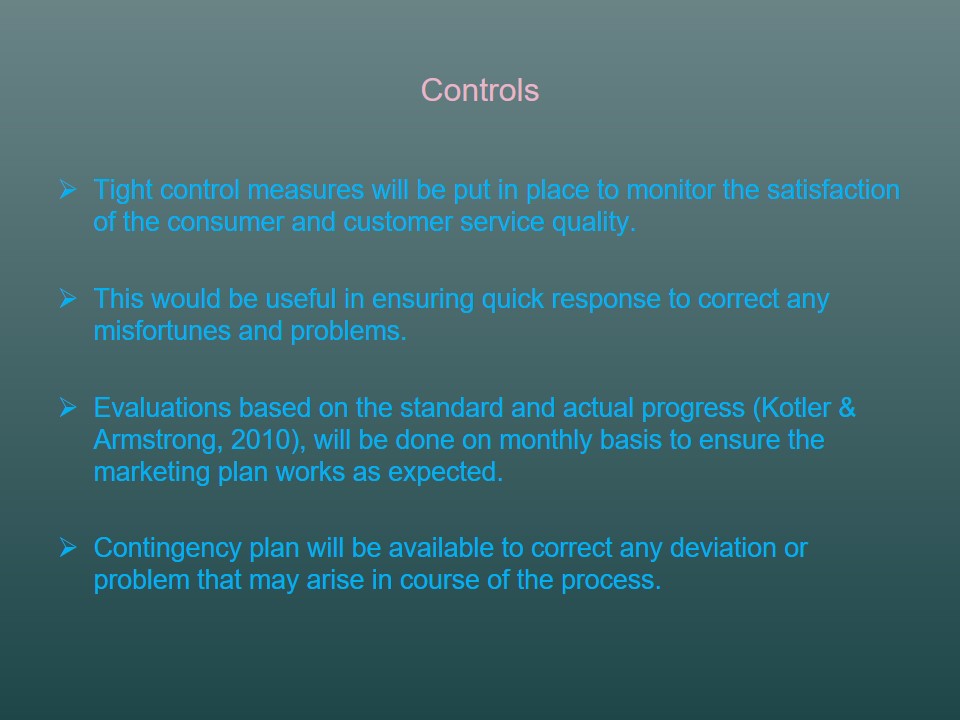
Metrics Needed to Monitor Marketing Plan Progress
The following are the metrics that shall be employed in the monitoring of the marketing plan progress as provided by Marketing Teacher Ltd (2011).
- Ratio analysis;
- Cash flow statements;
- Distributor support;
- Budgets;
- Quality controls;
- Sales analysis;
- Market acceptance and relations;
- Customer relation management (CRM).
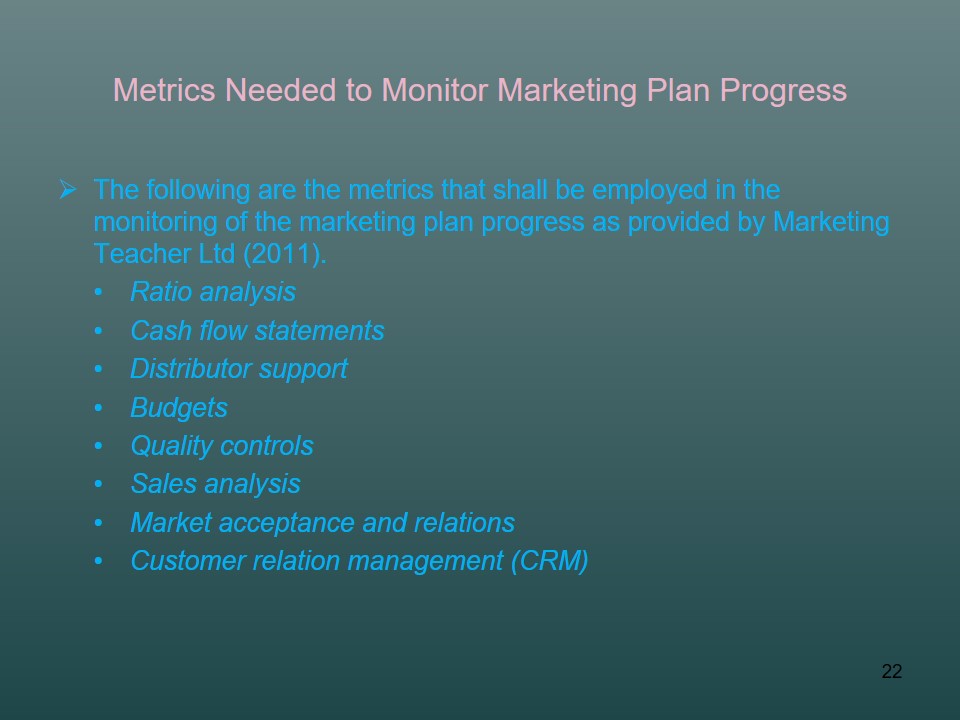
Reference List
Baskin Robins. (2011), Fun facts. Web.
Boone, L. E., & Kurtz, D. L. (2012). Boone & Kurtz contemporary marketing / David L. Kurtz. Mason, OH: South-Western Cengage Learning.
Kotler . P., & Armstrong .G. (2010). Principles of Marketing. New York: Pearson.
Kumar, N. et al. (2001). Marketing Management. New Delhi, Anmol Publications PVT. Ltd.
Kurtz, D. L., Mackenzie, H. F., & Snow, K. (2011). Contemporary marketing. Toronto: Nelson Education.
Lamb, C. W., Hair, J. F., & McDaniel, C. D. (2006). Essentials of marketing. Mason, Ohio: South-Western, Thomson Learning.
Marketing Teacher Ltd. (2011). Marketing Controls: Measuring and monitoring the marketing planning process. Web.
McDonald, M., & Wilson, H. (2011) Marketing plans: how to prepare them, how to use them. Chichester: Wiley.